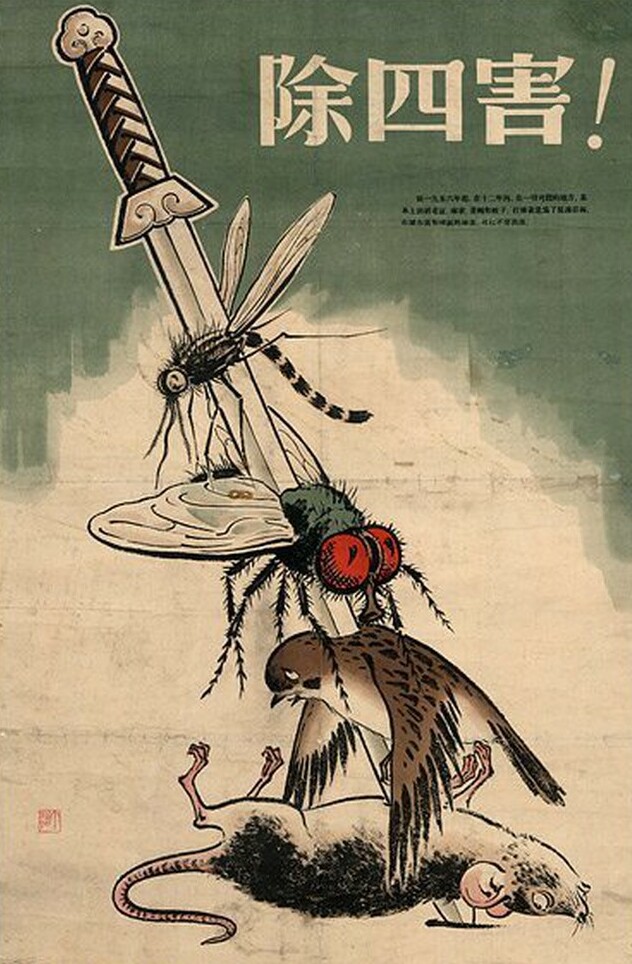The Domino Effect of Ecosystem Disruption: From Mao’s Campaign Against Pests to Dysbiosis in the Human Gut
In 1959, Mao initiated a campaign to eliminate sparrows and rats, which were deemed highly harmful. Agricultural lands faced devastating locust and caterpillar infestations, leading to a famine that claimed over 30 million lives. Mao's battle against pests serves as a powerful reminder of the unforeseen and severe consequences that can arise from disrupting natural systems. The gut microbiota is a similarly delicate and complex ecosystem. As we better understand the importance of microbial diversity, Fecal Microbiota Transplantation (FMT) emerges as a valuable tool for restoring balance in the gut. Mao's campaign highlights a vital principle: whether in an ecosystem or the human body, the best way to protect health is not through eradication of perceived threats, but by maintaining balance.
11/13/20243 min read


The history of ecological disasters provides essential lessons on the dangers of disrupting nature’s balance. One of the most well-known examples is Mao Zedong’s campaign in 1958, aimed at increasing China’s grain production by eradicating sparrows and rats. This seemingly harmless intervention turned into an environmental catastrophe, demonstrating that the elimination of even a few species can have severe and unexpected consequences. Today, a similar principle applies to the microbial ecosystem in the human gut. Excessive antibiotic use, dietary imbalances, environmental factors, and metabolic diseases contribute to the loss of microbial diversity in the gut, leading to various health issues and worsening existing conditions. Fecal Microbiota Transplantation (FMT) has emerged as a promising method for restoring gut health, much like reintroducing plant or animal species into degraded ecosystems to restore balance.
The Campaign Against Sparrows and Rats: A True Environmental Disaster
Mao’s campaign aimed to eliminate four "pests" believed to harm China’s agricultural output: sparrows, rats, flies, and mosquitoes. With the belief that each sparrow consumed about 4 kilograms of grain per year, the government mobilized the public to eradicate these birds. However, this campaign ignored the role of sparrows in the food chain. Sparrows are natural predators of insects, and their removal led to a massive surge in locust populations, which devastated crops. This unforeseen consequence contributed to one of the worst famines in history, resulting in millions of deaths. This tragic example highlights how delicately balanced ecosystems are. Sparrows and rats were perceived as insignificant or easily replaceable, but their absence underscored the importance and necessity of each species in the ecosystem
A Similar Case in the Human Gut: The Importance of Microbial Diversity
The human gut is a complex ecosystem that houses thousands of species, including bacteria, fungi, and viruses. We understand the importance of this system to human health through numerous studies demonstrating positive changes in disease progression following FMT treatment, which replenishes mediators and factors in the gut. This microbial community, known as the gut microbiota, performs essential functions, from synthesizing certain vitamins and aiding digestion to regulating immune responses and protecting against pathogens. Like natural ecosystems, a disturbance in the gut microbiota, known as dysbiosis, can trigger a domino effect, contributing to a range of health issues, from gut diseases to metabolic and neurological disorders.
When certain bacterial species decline or disappear due to antibiotics, poor diet, or environmental toxins, the gut ecosystem, much like the ecological destruction in China, becomes imbalanced. Some might consider the loss of a few bacterial species trivial; however, research shows that even minor disruptions can have significant health impacts. For example, dysbiosis has been associated with obesity, diabetes, inflammatory bowel disease, autism, neurological conditions, and even depression and anxiety. This delicate balance underscores that microbial diversity is as vital to human health as biodiversity is to natural ecosystems.
FMT: Restoring Balance in the Gut Ecosystem
Just as reintroducing species into natural ecosystems helps restore balance, a similar approach exists for gut health: Fecal Microbiota Transplantation (FMT). FMT involves transplanting stool from a healthy donor into the gut of a patient experiencing dysbiosis. Approved by the FDA for the treatment of Clostridium difficile infections, this procedure has shown great success in restoring gut balance. Beyond treating C. difficile, FMT has also shown potential in improving conditions such as irritable bowel syndrome, obesity, and neurological disorders.
Reintroducing sparrows into an ecosystem helps control pest populations and prevent agricultural collapse; similarly, FMT restores a healthy microbial environment in the gut. With a more diverse microbiota, the gut can regain its natural functionality, reducing inflammation, strengthening immunity, and potentially reversing the course of previously untreatable diseases
The Takeaway: Protecting Balance, Not Eradication
Mao's pest control campaign serves as a powerful reminder of the unforeseen and severe consequences that can arise when tampering with natural systems. Within the human body, the gut microbiota is a similarly delicate and complex ecosystem. Just as the eradication of sparrows and rats in China had disastrous effects, the absence or imbalance of specific bacterial species can threaten human health.
As we better understand the importance of microbial diversity, FMT emerges as a valuable tool for restoring balance in the gut. This technique doesn’t just target specific pathogens; it aims to rebuild the entire ecosystem. Like nature, it acknowledges that every species plays a role in overall health. The journey from Mao’s sparrow campaign to modern gut microbiome research reveals an essential truth: whether it’s an ecosystem or the human body, the most effective way to protect health is not by eliminating perceived threats but by preserving balance.
The Disruption of Ecosystem Balance: From Mao's Pest Control Campaign to Dysbiosis in the Human Gut
After the mass extermination of rats and sparrows initiated by Mao in 1958, China experienced a locust plague that led to a famine resulting in the deaths of millions of people. To combat the famine, the country imported carloads of sparrows from Canada and Russia. The loss of a seemingly insignificant type of bacteria in the gut due to antibiotics signifies a loss of health; the treatment for this is fecal microbiota transplantation.
Chinese poster reading "Exterminate The Four Pests", 1958.
